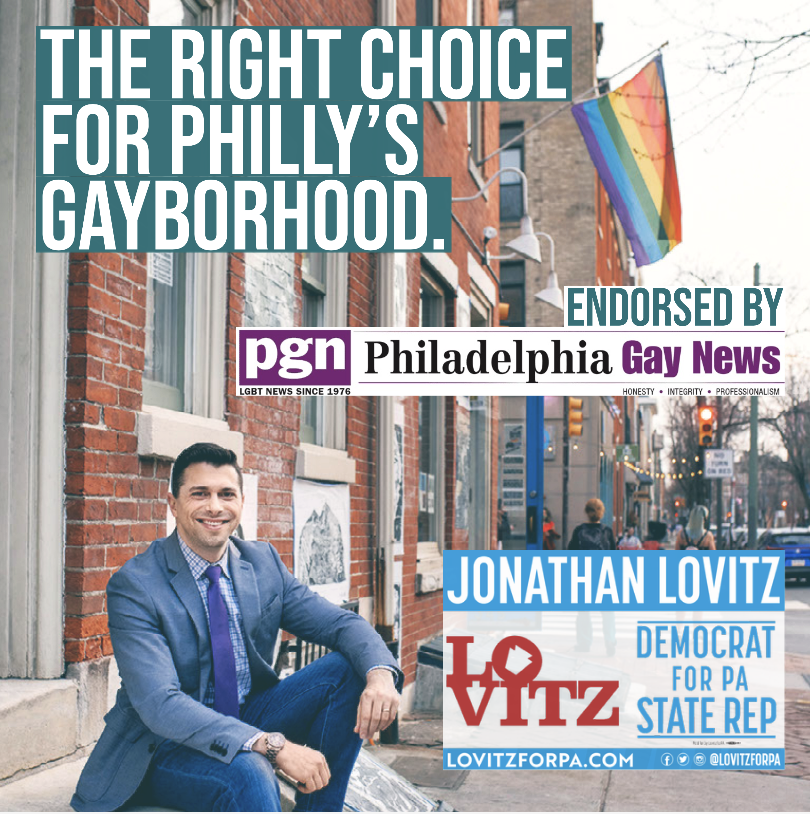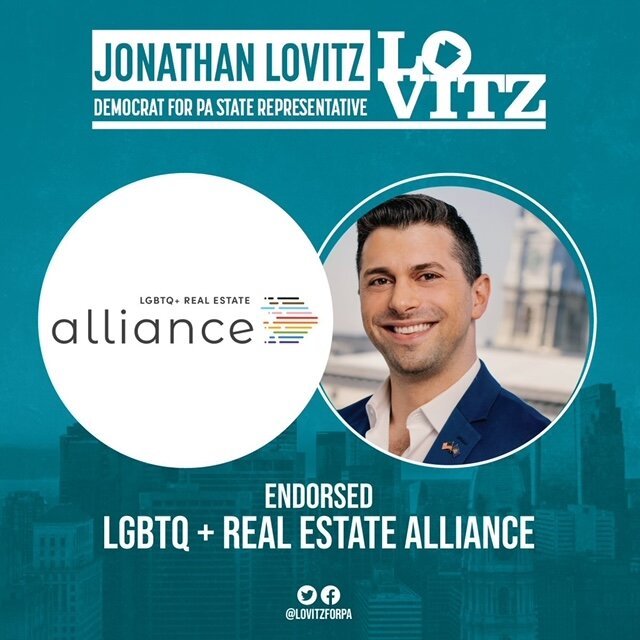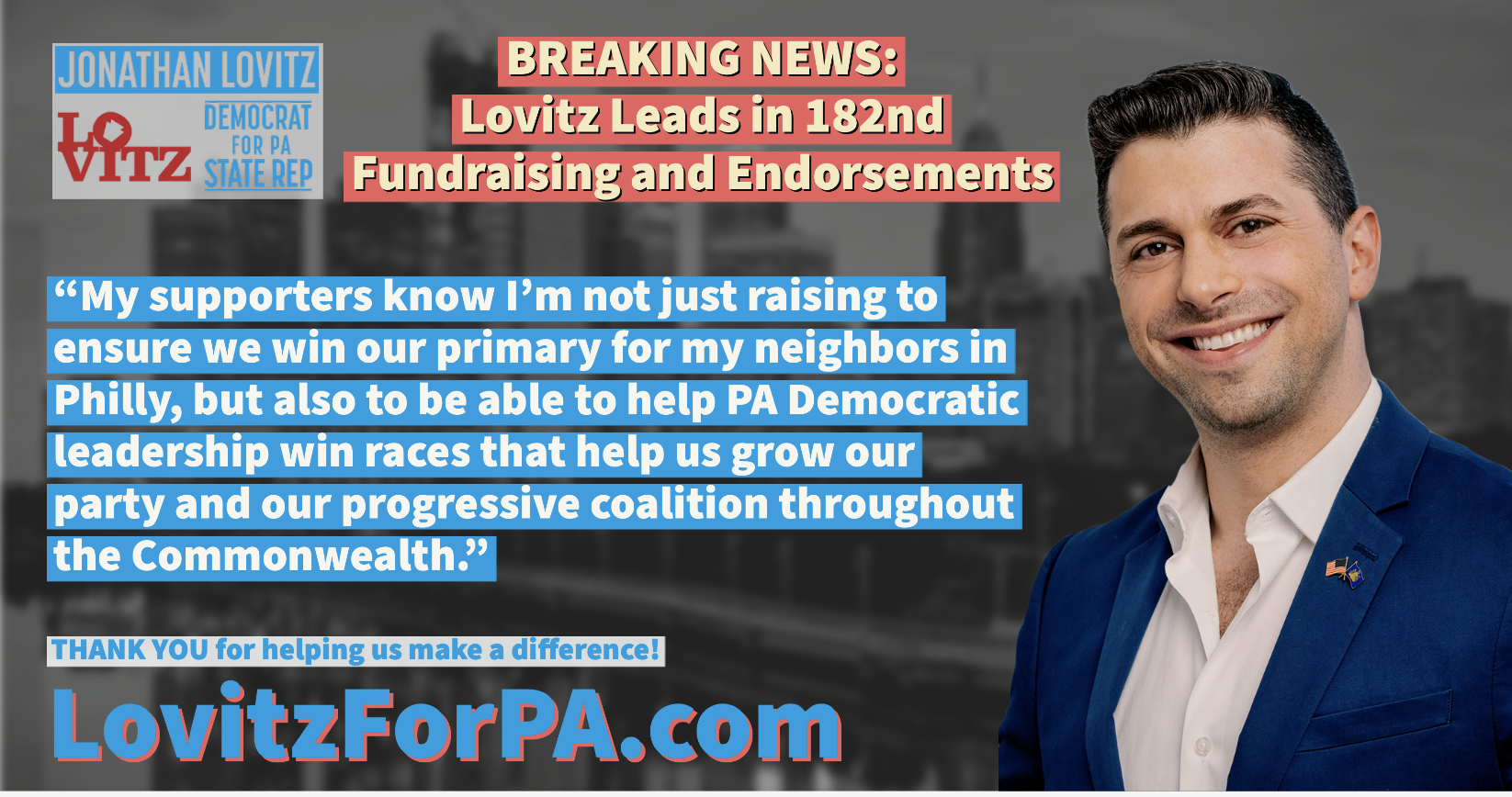#PrideSeries: Philadelphia’s Jonathan Lovitz; On Advocacy, Giving Back To His Community & The Legendary Community Activists He Now Stands With
Source: Instinct Magazine
By Michael Cook | July 1, 2019
All across the country, there are large cities that contain a prolific and outspoken LGBT community. From the Castro to Asbury Park to Boystown, these communities are diverse, community minded, and willing to stand up when they see injustice in the LGBT community that they reside in or beyond. In the “Gayborhood” of Philadelphia, Jonathan Lovitz is one of those citizens who can constantly be counted on to stand up. As the Senior Vice President of the National LGBT Chamber of Commerce, Lovitz speaks out for his community through lobbying, advocacy, and public speaking nationwide. He balances his advocacy with his marriage to NBC 10 meteorologist Steve Sosna, and as World Pride kicked off this week, I got a chance to sit down with Lovitz. We talked about everything from his beginnings in advocacy, the trailblazers he has gotten to work with and now call friends, and why his work with The Matthew Shepard Foundation remains one of his proudest accomplishments.
Michael Cook: As the SVP for the National LGBT Chamber of Commerce, what do you feel are the biggest issues facing our community today?
Jonathan Lovitz: Intersectionality issues and economic empowerment are the future of our movement. LGBT people are also women, people of color, immigrants, veterans, and every other diverse community— so their issues are ours, and our theirs. That is why those of us with the privilege to be in the rooms where change is made have the sacred obligation to advocate for those who can’t be there or have yet to be included at the table. We must all use the LGBT community’s trillion dollar clout to make a difference. Support your community when you shop, seek out LGBT-owned businesses when you invest, and stand by those corporations and allied communities who stand with us. The LGBT community is an economic force to be reckoned with — and every one of us plays a part in it.
MC: What does your career entail on a day to day basis in terms of how you work with the
community?
JL: The NGLCC, where I work now, is the business voice of the LGBT community. Our goal is to make sure every economic opportunity that is available to everyone else is available to LGBT people, and that we’re using the economic influence of the LGBT community and its supporters to affect change in America and around the world anywhere. My job entails overseeing media relations and public policy, political affairs, and strategic partnerships with other major organizations. I never imagined I’d become a lobbyist, but getting to work directly with Members of Congress, Governors, State Legislators, and Mayors across the country to enact pro-LGBT laws and policies has become of the most important and inspiring parts of my work each week. I also regularly speak to conferences and the press about LGBT economic empowerment and the vital role economics plays in creating equity for the LGBT community. I am honored to be a regular commentator on MSNBC, CNBC, NPR, The Advocate, Out Magazine, among others, and have often spoken or advocated for Broadway Cares / Equity Fights AIDS, The Trevor Project, GLSEN, the Democratic party, and more.
I’m so thankful that my work has continued to allow me to use my public profile and platform to help others. I regularly speak to high schools, colleges and universities encouraging young people to get involved in public service and use their passions to make a difference for their communities. While business and LGBT youth causes are my primary focus, I look for any chance to serve any community in need of a voice, including serving on multiple nonprofit Boards of Directors and municipal commissions.
MC: What made you want to get into public service and give back to your community?
JL: I’ve always had a loud mouth and a desire to put it to use. What started off as a career in the arts led to my current life of advocacy and service, but the skills needed are very much the same. It’s all about making people believe your story. Whether on stage or in a legislative hearing, I am trying to convince them that I need you do something when we leave here. It’s either applaud, or give money, or mentor a child — or whatever it is that right’s for you, I want you to walk away from our time together wanting to do something. I could never be the advocate or lobbyist that I am today had I not had all those years performing. The many helping hands I had along the way, and the many leaders I respect and emulate now have taught me an invaluable lesson: the privilege of privilege is the ability to put seats at the table for others who aren’t there yet.
Because of the exposure I got from my time with Logo TV, working in the news, etc I began speaking with a lot of groups that focus on LGBTQ youth. I love the work of The Trevor Project, GLSEN, and the Tyler Clementi Foundation. Now I work very closely through NGLCC with The Matthew Shepard Foundation, as well. That means so much to me, one, because I think Matt’s parents are so incredible, and I feel so blessed to know them, but also because one of my favorite roles when I was still in the theater was in The Laramie Project— which is the story about what happened after Matthew Shepard’s death. So to be sort of full circle now and working for the benefit of causes like those that we talked about in that play is really special to me. I was so fortunate to have a begun my career in the theatre and in television as they both took me all over the country as a performer. I met the most wonderful and inspiring LGBTQ people in all fifty states who are making a difference just by being out and proud about who they are. When I moved fully to television, I was publicly out about who I am and what I cared about— which was still a bit groundbreaking. It was 2009, before the much-welcomed outpouring of young LGBTQ performers and advocates in the media we have now. I consider the opportunity to serve my community that I have been given one of the greatest gifts I have ever received.
MC: So many people came before us in terms of advocacy. who do you think are some of your own biggest heroes?
JL: For those of us who live and work in the major cities where LGBTQ people are an essential and welcomed part of society, all of this celebrating and joy around Pride month might feel like just another holiday on the calendar. But for the millions of young people, especially in the deep south or rural midwest, they are looking at all of us with hope that they, too, can one day be out, proud, and successful. We have to live out loud for them. It’s our sacred obligation, built on the shoulders of the heroes of Stonewall and all who came before them, to ensure the youngest among us have a brighter, more welcoming future where being out and following their dreams never need to be mutually exclusive.
I am so very fortunate and grateful that my work in advocacy has allowed some of my heroes to become colleagues— and even better, friends. I once got to thank Harvey Fierstein backstage before a charity event we were in together for helping me find peace and acceptance with his plays, and especially his book for La Cage Aux Folles, when I was a teenager struggling with my identity. The same goes with Wilson Cruz and BD Wong, whose characters have done so much to save young lives through representation on stage and screen— and now they are both such close friends of mine. Along the way I have been able to work closely with the likes of Congressman Barney Frank, the first out man in federal elected office, who has certainly inspired my passion for service, as has my close friend (and new neighbor in Philadelphia) Rep. Brian Sims. Jim Obergefell, the winning plaintiff in the Supreme Court marriage equality case, has become of my closest friends and did me the incredible honor of marrying my husband Steve and me in October of 2017. He also introduced us the incomparable Edie Windsor, who left us far too soon.
MC: Speaking of your husband, you’re married to NBC Meteorologist Steve Sosna. Tell me about how you two found each other.
JL: After years of ‘knowing of’ one another through mutual friends and professional circles, we finally struck up conversation at the Out Magazine Pride Party in 2014. While on opposite schedules at the time, Steven (who was up at 2 AM for morning weather reporting) messaged me early one afternoon thinking it would be hours or days before he would respond. I (who was working from home at the time), replied immediately– and began Googling weather puns to win Steve over. It’s been five years of Dad jokes ever since. Within days of our first date, a mutual friend who work in news was offered a weekend getaway in upstate New York and invited us, knowing there was something special happening between us. He was right– going away together just days after officially starting to date showed us that we were good at our three favorite activities: traveling, relaxing, and eating. After a year together our schedules stabilized a bit, with Steve moving to daytime TV hours and I traveling a bit less frequently for work. We moved in together in Midtown Manhattan where they built a chosen family of close friends and neighbors. In August 2016, I invited my parents and Steve to Palm Springs, California to relax during the day while I attended my company’s annual conference. My parents were celebrating their 45th wedding anniversary that year, and so it was already a special time to be together. On Friday, August 26th, 2016 (our two year anniversary), I asked Steve to marry me — all caught on a video complete with my mother adorably sobbing in the background. Steve and I were elated to have someone as special to us– and to the gay community– as Jim Obergefell marry us on a boat in front of the Statue of Liberty in October 2017, surrounded by our closest friends and family.
MC: You both have made Philadelphia your home; what is it about the City of Brotherly Love that you both fell in love with?
JL: I was born in South Jersey and I grew up in Florida, but we had a summer house at the Jersey shore, so coming to Philly was a part of my childhood. I have fond memories of spending several birthdays at the Franklin Institute walking through the giant heart, or visiting the Camden Aquarium or the Liberty Bell. It’s neat being back here as an adult, when I can check everything out with a new appreciation. I never imagined I’d be living here, but this city has welcomed my husband and me with open arms. As one of the most racially and socially diverse cities in America, everything about Philly celebrates the importance of communities coming together to solve problems and find solutions that reflect the richness of diversity around them. This is a scrappy city of hardworking, passionate people— and I am falling in love with the large number of local organizations that do so much for so many communities here. I look out my office window and see nothing but cranes in the sky building new towers and apartments. It’s very much a city on the rise, and Steve and I are loving our time here, especially the nonprofits who have been so generous in asking us to emcee events and support them locally. I look forward to finding many opportunities to be of service to my community in my new city and state.
MC: How do you balance busy careers and making time for your relationship?
JL: I have never known anyone as passionate and dedicated to his work than my husband, Steve. That is what has always been so attractive and him. Our mutual respect for one another’s passions and ambition help us deal with long stretches of time apart for projects. We make our time together extra special by planning lots of day trips and long weekends that work around two lives often dictated by breaking news and weather. Our friends and family are sacred to us, and we relish every chance to put our phones away and just be present with the people we love most. Communication is everything, and for two people who spend all day, every day talking sometimes just a smile across the room is all we need to remind each other how lucky we are.
MC: What’s next for Jonathan Lovitz as you look down the road at your career and life?
JL: I am very much considering a run for elected office in the very near future! I’d love to serve in office; it’s something I’ve wanted since I first got a taste of politics volunteering with the Kerry campaign in college back in 2004. My friends and family know how much using the platforms I’ve been given to help others means to me, and I can’t think of a better way to honor the legacy of the Stonewall pioneers than to be sure their community’s issues— and the issues of every community— are represented well by someone who deeply believes in the power of people to create change.
MC: What gives you pride?
JL: Visibility gives me pride. We have come so far in the fifty years since Stonewall, and while the road ahead is long and uncertain, it has more allies and more out members of our family on it than ever before. I end every speech or lecture I give with these words that push me to keep serving by the brilliant queer anthropologist Margaret Mead: “Never doubt that a small group of thoughtful, committed citizens can change the world; indeed, it’s the only thing that ever has.” I am so proud to be a part of a community whose mere visible existence is an act of defiance and a profound statement that we are all committed to changing the world so it welcomes and celebrates all of us.
Home


